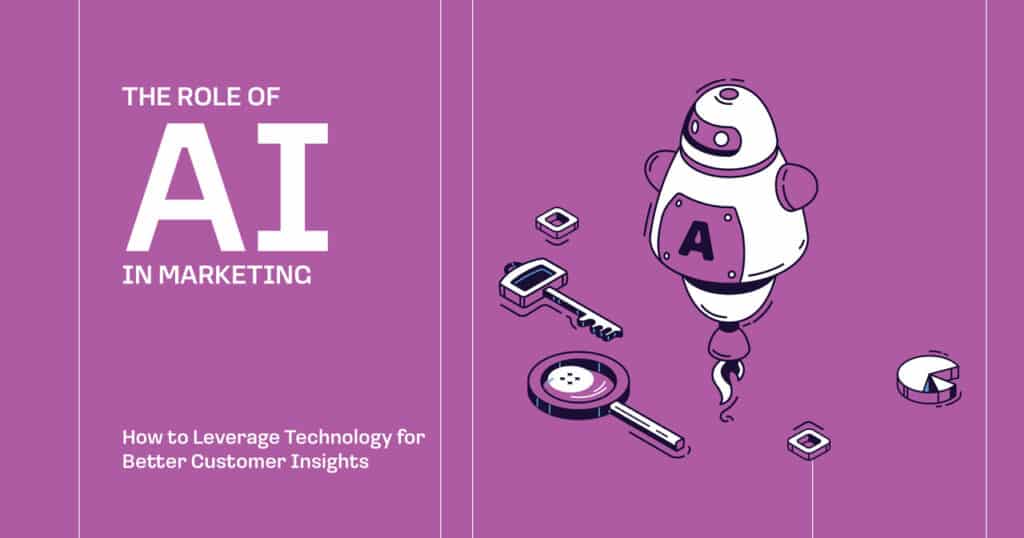Artificial Intelligence, or AI for short, is a term so often used that the meaning behind it seems lost. At its simplest, AI is the ability of a machine to simulate human thought processes, learn, and problem-solve. Think of an assistant who can scan data loads, understand your requirements, and predict your actions. That’s AI.
Essential Takeaways
- AI Transforms Marketing, AI is revolutionizing marketing by providing deeper customer insights, enhancing personalization, and enabling data-driven decision-making.
- Implementation is Vital, The goal of AI should be very clear, and the marketing teams should be properly trained and given the right tools.
- Keep Ethical, Adopt AI, ensuring data privacy and ethics to earn customers’ confidence.
AI is not just about robots and the future; it is more about making our lives easier and our choices smarter. Using massive amounts of data in marketing, AI can discover insights that would have taken human weeks or months to understand and can help marketers better connect with their audiences.
The Evolution of Marketing With AI
Marketing has evolved beyond the traditional methods of cold calling and direct mail. With the advent of the Internet, businesses found their way to reaching customers through digital platforms, and even that has evolved. To this end, AI is an innovation reshaping how brands communicate with their consumers.
AI has changed the landscape. They were once mere data analysts but are now advanced algorithms that predict consumer behavior patterns. The marketers used to bank on instinct and an indefinite sense of rough demographics yesterday. Today, AI is applied at the point of audience based upon proper knowledge about consumer behavior, preferences, and trends in the future. It feels like a crystal ball that sees what customers want even before they know!
Why AI Matters in Marketing
Enhancing Customer Understanding
Effective marketing, at its core, is an understanding of customers. How do you sell to someone if you need to know what he or she likes or wants? AI takes customer understanding to a different level. It builds a comprehensive picture of what your customers like based on their data inputs, such as social media interactions, purchase history, and online behavior.
This increased awareness allows brands to craft messages, promotions, and marketing efforts more precisely. For instance, AI can determine which products are most likely to resonate with which groups of consumers, allowing marketers to make even more targeted overtures. This results in stronger connections and relationships with customers.
Data-Driven Decision-Making
In marketing, decisions were ruled by assumptions and general trends. Today, they are governed by data. AI enables marketers to make better decisions based on more accurate and effective data-driven decisions. Data is harvested through machine learning algorithms that quickly analyze large datasets and deliver actionable insights.
Now, imagine a retailer wanting to introduce a new product. Instead of relying on historical sales data, AI can examine market trends, preferences, and competitor performance for an all-inclusive view of the new product’s prospects of success. This decreases risk and offers a more promising launch.
Fundamental AI Technologies in Marketing
Machine Learning
Machine learning is a subset of AI that focuses on the development of algorithms that can learn from and make predictions based on data. In marketing, this technology is used for various applications, such as,
- Recommendation Engines. Think of how Netflix suggests movies based on your viewing history. Similarly, e-commerce platforms like Amazon use machine learning to recommend products to customers, enhancing their shopping experience and boosting sales.
- Customer Segmentation. Machine learning algorithms can analyze customer data and identify distinct segments within your audience. This enables marketers to create targeted campaigns tailored to each group’s needs and preferences.
Predictive Analytics
The more dramatic utility of AI is predictive analytics. It helps organizations predict future trends based on historical data. Patterns are revealed, and the probabilities of outcomes are forecast using statistical algorithms and machine learning techniques.
For example, a company can use predictive analytics to pinpoint its most likely-to-churn customers. Then, it can intervene early through proactive measures such as targeted promotions or personalized communication to retain those customers.
Natural Language Processing (NLP)
- Natural Language Processing (NLP) is a subdiscipline of AI. Its central theme is how humans can interact with computers using natural language. NLP refers to the ability of machines to understand and generate valuable human language.
In marketing, NLP is used for a variety of purposes, including,
- Chatbots. Many companies now use AI-powered chatbots to handle customer inquiries in real-time. These chatbots can answer questions, provide product recommendations, and even assist with purchases, creating a seamless customer experience.
- Sentiment analysis. These algorithms can analyze customer feedback on social media or review sites to determine the overall sentiment toward a brand or product. This information can be precious to businesses, helping them improve their offerings and address customer concerns.
Leveraging AI for Better Customer Insights
AI-Powered Customer Segmentation
As discussed above, customer segmentation is the most essential aspect of effective marketing. Artificial intelligence can take this practice to the next level by sifting through vast data to uncover specific, intricate customer segments. Instead of demographics, AI digs into behavioral patterns, preferences, and purchasing habits.
Take, for instance, travel companies. A firm might leverage AI to segment its customers according to their travel history, preferences (adventure or relaxation), and social media activity. In this manner, it would make very targeted marketing campaigns to appeal much more to every group.
Personalization at Scale
One of the buzzwords in marketing is personalization and for all the right reasons. Today’s customer is expected to have a unique experience, whereas AI allows large-scale delivery of individualized content, offers, and recommendations.
Imagine receiving an email from your favorite clothing brand that includes items you’ve previously viewed and suggests complementary pieces based on your style. That’s the power of AI-driven personalization! It enhances the customer experience and drives higher conversion rates.
Real-Time Analytics and Feedback
In today’s rapidly evolving marketing landscape, real-time data is essential for marketers. Artificial Intelligence provides instant insights into customer behavior, campaign performance, and market trends, enabling marketers to make swift decisions and adjust their strategies on the fly.
For example, if a campaign is underperforming, AI can analyze the data and propose adjustments to the messaging, targeting, or even timing. That responsive level can keep your business competitive and properly reply to customer needs.
Implementing AI in Your Marketing Strategy
Identifying Your Goals
Clear goals before applying AI. What kind of goal are you trying to achieve here, customer engagement, sales, or brand awareness? This will give you specific objectives for integrating these AI activities with the larger marketing strategy.
Questions to Consider
- What specific customer insights do you want to gain?
- How will you measure the success of your AI initiatives?
- What challenges do you anticipate, and how can you address them?
Choosing the Right Tools
With the plethora of AI tools available, selecting the right ones for your marketing strategy can be overwhelming. Here are some popular AI marketing tools and platforms to consider,
- HubSpot. Offers a suite of marketing, sales, and customer service tools with AI capabilities, including chatbots and predictive analytics.
- Salesforce Einstein. An AI layer that provides advanced analytics and insights to enhance customer relationships.
- Google Analytics. While not exclusively an AI tool, Google Analytics incorporates machine learning features to help marketers understand user behavior on their websites.
When evaluating AI tools, consider your needs, budget, and ease of integration with existing systems.
Training Your Team
Implementing AI successfully requires a skilled team that effectively leverages technology. Investing in training and development for your marketing team is essential.
- Workshops and Seminars. Organize workshops or seminars to educate your team about AI trends, tools, and best practices.
- Online Courses. Encourage team members to take online courses on AI in marketing to enhance their knowledge and skills.
- Collaboration with Tech Teams. Foster collaboration between your marketing and IT teams to ensure smooth implementation and troubleshooting of AI technologies.
Challenges and Considerations
Data Privacy and Ethics
As businesses collect more data to fuel their AI initiatives, it’s crucial to prioritize data privacy and ethical considerations. Customers are increasingly concerned about how their data is being used, and businesses must comply with regulations like GDPR and CCPA.
- Transparency. Be transparent with customers about what data you collect and how it will be used.
- Consent. Ensure you have explicit customer permission before collecting and using their data for marketing purposes.
Overcoming Resistance to Change
Introducing AI into your marketing strategy may face resistance from team members or stakeholders who are hesitant to embrace new technology. Here are some strategies to overcome this resistance:
- Highlight Benefits. Communicate the benefits of AI, such as improved efficiency, enhanced customer insights, and increased revenue.
- Start Small. Begin with small AI projects that demonstrate quick wins. This can help build confidence in the technology and its capabilities.
- Encourage Feedback. Foster an environment where team members feel comfortable providing feedback about their experiences with AI tools. This can help identify areas for improvement and build a culture of innovation.
Future Trends in AI Marketing
The Rise of Conversational Marketing
AI chatbots and messaging platforms have become increasingly popular among brands. This innovative marketing approach enables companies to engage in real-time customer conversations, offering instant responses and facilitating smooth transactions.
Continued consumer momentum toward fast and efficient interaction will ensure that conversational marketing becomes one of the next crucial strategies for strengthening customer experience while increasing sales.
Enhanced Predictive Capabilities
With heavy advancements in machine learning algorithms, predictive analytics has a bright future. Such developments will unleash even more precise predictions and a deeper understanding of the customer’s behavior.
The changes would give firms a near-excellent understanding of customers’ preferences, enabling them to move towards targeted marketing.
Integration of AI With Other Technologies
It’s not a standalone technology, but one that integrates various emerging technologies like the Internet of Things (IoT) and augmented reality (AR). This will open up exciting new ways for brands to engage with customers creatively and innovatively.
For example, using IoT, retailers may be able to collect time-sensitive data about customer preferences while inside the store. The information is then optimized in inventory through AI algorithms, enhancing the shopping experience.
Final Thoughts
AI marketing is here to live up to expectations. It is transforming the game on how businesses contact customers. AI tools promises to help marketers tap into valuable insights, build tailored experiences, and make decisions backed by data, assuring results.
As a person embarks on their AI journey, it is critical to define objectives, select the best tools for the job, and pay attention to staff training. This thoughtful approach to AI allows it to be an incredible enabler of your overall marketing strategy, helping you to navigate ever-changing landscapes and the changing needs of your customers.
That means embracing AI, keeping up with the curve, and helping your brand position itself for future success. So what are you waiting for? Dive into the world of AI in marketing and watch your business thrive!
FAQs
- How can AI improve customer engagement?
AI enhances customer engagement by analyzing data to understand preferences, enabling personalized marketing efforts, and providing real-time responses through chatbots and other interactive tools.
- What are some examples of AI tools used in marketing?
Popular AI tools include HubSpot, Salesforce Einstein, Google Analytics, and various chatbot platforms facilitating customer interactions.
- Is AI expensive to implement in marketing?
The cost of implementing AI in marketing can vary widely depending on the tools and strategies used. While some solutions may require significant investment, many affordable tools and platforms are available for businesses of all sizes.
- How does AI handle data privacy?
AI systems should prioritize data privacy by being transparent about data collection practices, obtaining customer consent, and complying with relevant regulations such as GDPR and CCPA.
- What future trends should marketers watch for regarding AI?
Marketers should monitor the rise of conversational marketing, enhanced predictive analytics, and the integration of AI with other emerging technologies like IoT and AR.









